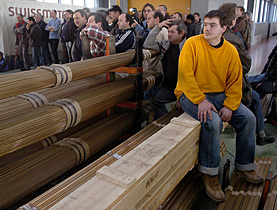A “win-win way” to beat the financial crisis

Skilled workers from the Swiss watchmaking industry could soon find themselves building locomotives instead.
A new project to meet the challenges posed by the financial crisis has been launched in the French-speaking canton of Vaud, with the backing of the major trade union and employers associations, as well as the cantonal government.
The idea is that businesses experiencing a temporary shortfall in orders will be able to lend their workers to others facing a shortage of labour.
“It’s pretty ridiculous to pay people to sit around and do nothing,” Yves Defferrard of the Unia trade union told swissinfo. “But when they have no work for them, employers can often think of nothing better than to lay them off. That’s the wrong way to manage a crisis. It’s what happened in the downturn of 2000.”
The exchange idea is a win-win situation for all, according to Nicky Le Feuvre, a specialist in the sociology of occupations at Lausanne University.
“The companies don’t have to retrain workers because they’ve managed to keep on their highly qualified staff, and the workers don’t risk being made unemployed temporarily or permanently when there’s a downturn in their particular company,” she said.
“One of the reasons why the local government is involved is that this will save on unemployment benefit, but they are also concerned about preserving the industrial tissue of the region.”
How it works
Businesses with too many or too few workers simply need to ring a dedicated 0900 number run by the association of employers of the precision instrument industry, GIM-CH. Suitable companies are then put in touch with each other.
As far as the workers are concerned, their contract is still with their original employers and the only thing that changes is their place of work. Any extra costs – such as travel expenses – will be reimbursed.
The giving and receiving enterprises draw up fixed-term contracts, normally anything between one month and one year with the possibility of extension if necessary, and sort out the financial arrangements.
A similar exchange system was tried on a limited scale between three major enterprises in 2004 and 2005 and turned out to be very successful. Now with the hotline much smaller businesses will also be able to benefit.
Interchangeability
At a time when economic woes are hitting the headlines, it may be a surprise to realise that some branches of industry are doing well and do not have enough trained people.
Defferrard cited the locomotive building industry and the medical industry as two areas which are crying out for workers, while other branches of engineering and the watchmaking sector are facing a shortage of orders.
As far as mechanics, electricians and technicians are concerned, the same basic skills can be applied across the industry. It is therefore feasible to swap them between one branch and another.
Defferrard brushed aside fears that workers could be poached by rivals. In the first place, within the canton there are few companies in direct competition with each other.
“The aim isn’t to pinch workers from someone else. I have no worries at all on that score,” he said, pointing out that if any company acted dishonourably, no one would help it out again.
Nor does he think the workers themselves are likely to be so pleased with their temporary employer that they will desert their original company.
“Working conditions are practically the same everywhere. The engineering industry has a national agreement which goes back to 1937, so working conditions are pretty fair.”
Future
It is true that the experience will enhance the profile of those involved, but that will benefit the parent company. “The workers will have seen other ways of doing things, and they can bring back new ideas to their employers.”
But should they want to change jobs permanently, they would have to go through the normal recruitment procedures.
The project has been launched on a cantonal level, but it could spread, first to the rest of the French-speaking area and possibly to the German-speaking part of Switzerland too.
The two bodies behind the scheme, the Unia trade union and the employers’ association, the GIM-CH, are both nationally organised, and thus in a position to promote the scheme nationwide.
It is too early to speak of success, but even in the first week after its launch a number of businesses had phoned the hotline, Defferrard said. The overall impact of the scheme will be assessed after one year.
swissinfo, Julia Slater
The GIM-CH estimates that by 2020 the mechanical engineering industry will need 20,000 qualified workers.
However, the current economic slowdown directly threatens 2000-3000 jobs in French-speaking Switzerland, according to the Unia trade union.
Canton Vaud expects to see its GDP fall by 0.4 per cent in real terms in 2009, a lower rate than that forecast for Switzerland as a whole.
The chemical industry is expected to grow in the canton in 2009, but machine tool making and the watchmaking industry are likely to be among the major casualties of the financial crisis.
The technical industries in the canton are very varied, with 3,000 enterprises and a work force of 30,000.
By their nature, they depend on irregular orders, and thus experience periods of overwork and underwork.
The scheme for loaning workers has already been tested by the packaging firms Bobst and Sapal, and by the locomotive builder Bombardier.

In compliance with the JTI standards
More: SWI swissinfo.ch certified by the Journalism Trust Initiative



You can find an overview of ongoing debates with our journalists here. Please join us!
If you want to start a conversation about a topic raised in this article or want to report factual errors, email us at english@swissinfo.ch.